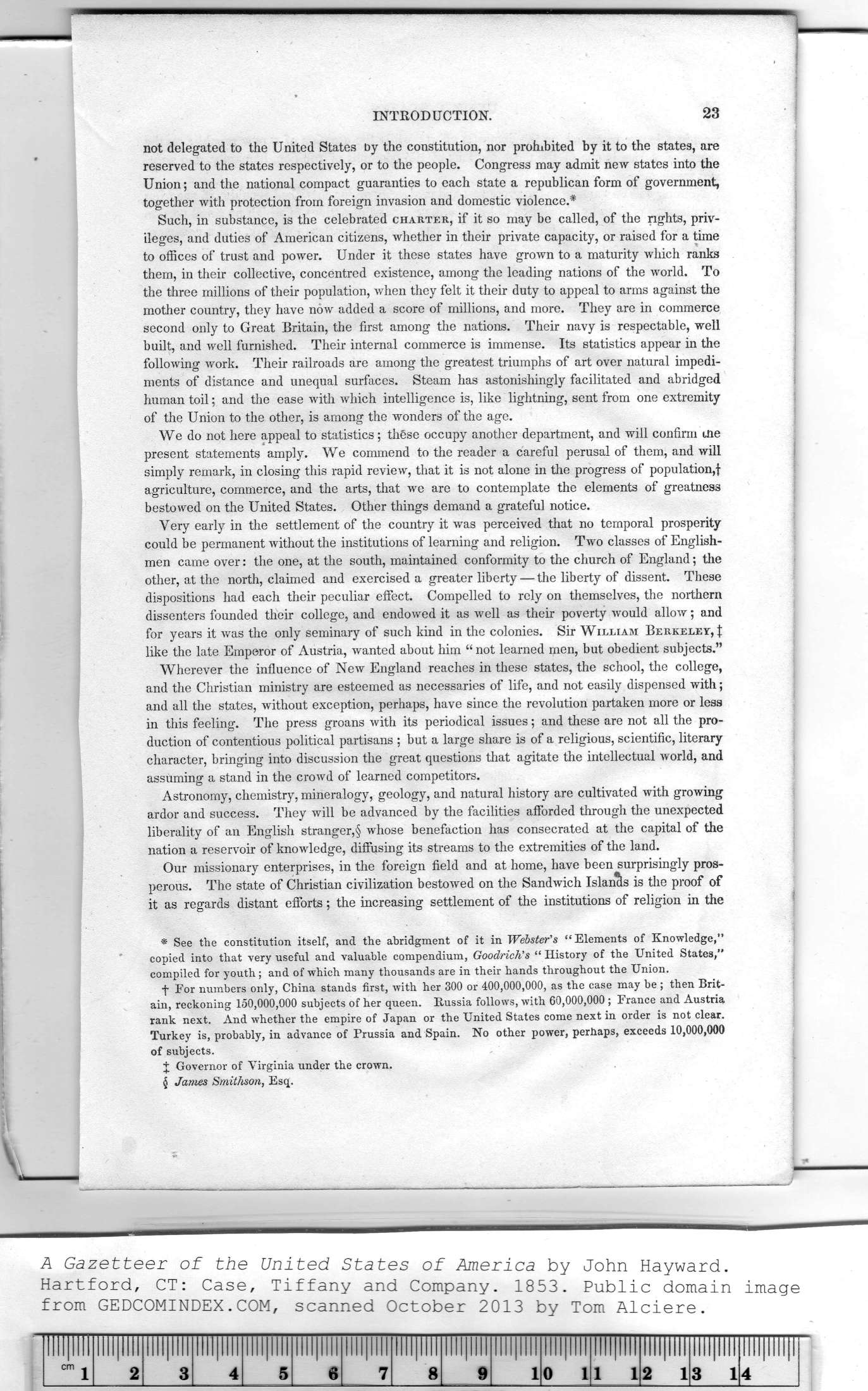|
|
Note: Ctrl and + increases the font size of the text below, Ctrl and - decreases it, and Ctrl and 0 resets it to default size.
INTRODUCTION. 23
not delegated to the United States by the constitution, nor prohibited by it to the states, are
reserved to the states respectively, or to the people. Congress may admit new states into the
Union; and the national compact guaranties to each state a republican form of government,
together with protection from foreign invasion and domestic violence.*
Such, in substance, is the celebrated charter, if it so may be called, of the rights, priv-
ileges, and duties of American citizens, whether in their private capacity, or raised for a time
to offices of trust and power. Under it these states have grown to a maturity which ranks
them, in their collective, concentred existence, among the leading nations of the world. To
the three millions of their population, when they felt it their duty to appeal to arms against the
mother country, they have now added a score of millions, and more. They are in commerce
second only to Great Britain, the first among the nations. Their navy is respectable, well
built, and well furnished. Their internal commerce is immense. Its statistics appear in the
following work. Their railroads are among the greatest triumphs of art over natural impedi-
ments of distance and unequal surfaces. Steam has astonishingly facilitated and abridged
human toil; and the ease with which intelligence is, like lightning, sent from one extremity
of the Union to the other, is among the wonders of the age.
We do not here appeal to statistics; these occupy another department, and will confirm cue
present statements amply. We commend to the reader a careful perusal of them, and will
simply remark, in closing this rapid review, that it is not alone in the progress of population,f
agriculture, commerce, and the arts, that we are to contemplate the elements of greatness
bestowed on the United States. Other things demand a grateful notice.
Very early in the settlement of the country it was perceived that no temporal prosperity
could be permanent without the institutions of learning and religion. Two classes of English-
men came over: the one, at the south, maintained conformity to the church of England; the
other, at the north, claimed and exercised a greater liberty — the liberty of dissent. These
dispositions had each their peculiar effect. Compelled to rely on themselves, the northern
dissenters founded their college, and endowed it as well as their poverty would allow; and
for years it was the only seminary of such kind in the colonies. Sir William Berkeley, f
like the late Emperor of Austria, wanted about him “ not learned men, but obedient subjects."
Wherever the influence of New England reaches in these states, the school, the college,
and the Christian ministry are esteemed as necessaries of life, and not easily dispensed with;
and all the states, without exception, perhaps, have since the revolution partaken more or less
in this feeling. The press groans with its periodical issues; and these are not all the pro-
duction of contentious political partisans ; but a large share is of a religious, scientific, literary
character, bringing into discussion the great questions that agitate the intellectual world, and
assuming a stand in the crowd of learned competitors.
Astronomy, chemistry, mineralogy, geology, and natural history are cultivated with growing
ardor and success. They will be advanced by the facilities afforded through the unexpected
liberality of an English stranger,§ whose benefaction has consecrated at the capital of the
nation a reservoir of knowledge, diffusing its streams to the extremities of the land.
Our missionary enterprises, in the foreign field and at home, have been surprisingly pros-
perous. The state of Christian civilization bestowed on the Sandwich Islands is the proof of
it as regards distant efforts; the increasing settlement of the institutions of religion in the
* See the constitution itself, and the abridgment of it in Webster's “Elements of Knowledge,"
copied into that very useful and valuable compendium, Goodrich's “ History of the United States,"
compiled for youth; and of which many thousands are in their hands throughout the Union.
•f For numbers only, China stands first, with her 300 or 400,000,000, as the case may be ; then Brit-
ain, reckoning 150,000,000 subjects of her queen. Russia follows, with 60,000,000 ; France and Austria
rank next. And whether the empire of Japan or the United States come next in order is not clear.
Turkey is, probably, in advance of Prussia and Spain. No other power, perhaps, exceeds 10,000,000
of subjects.
J Governor of Virginia under the crown.
§ James Smithson, Esq.
|
